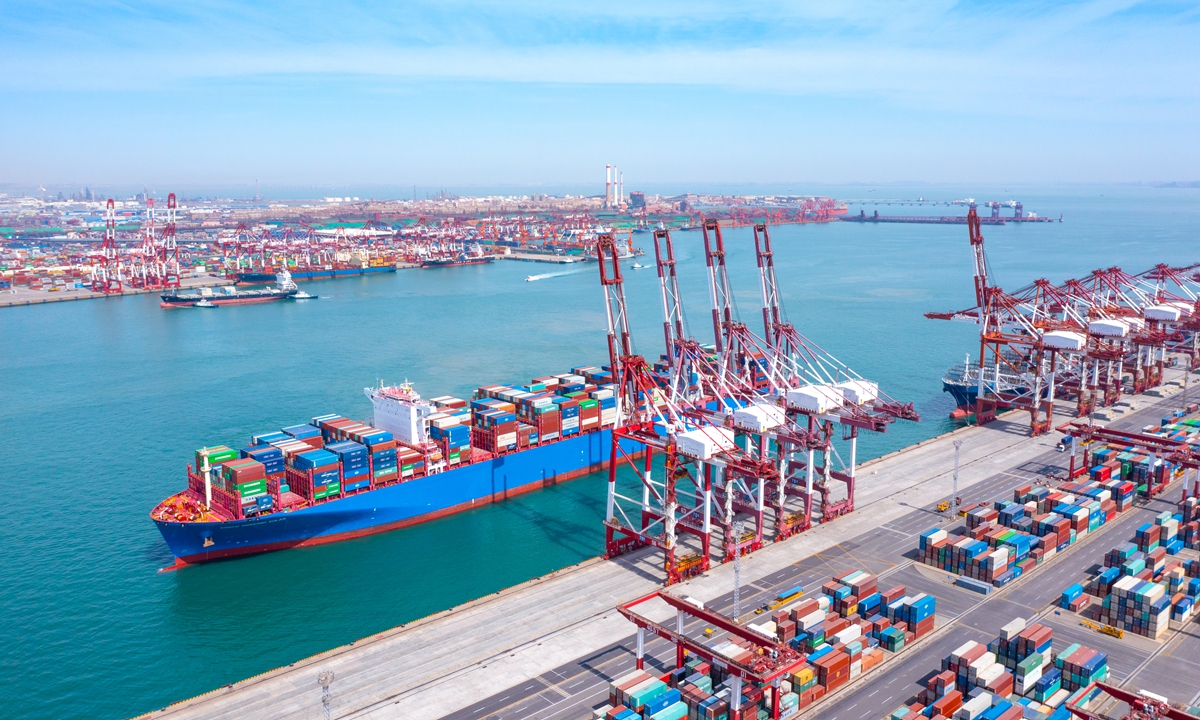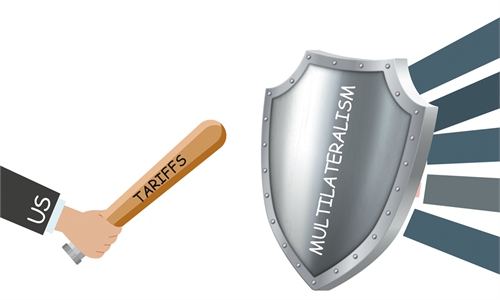OPINION / GLOBAL MINDS
Closing down trade the opposite of what is needed for a dynamic society

The view of a port in Qingdao, East China's Shandong Province. Photo: VCG
Editor's Note:The outcomes of the recent high-level economic and trade talks between China and the US over tariffs, which are widely considered a good starting point, came at a time when US tariffs continued to cripple the world economy, including the US economy. In late April, dozens of the world's top economists, including James Heckman (Heckman), an American economist and Nobel laureate, signed an "anti-tariff declaration" stating that the "reciprocal tariffs" being threatened and imposed by the US on other countries are calculated using an erroneous and improvised formula with no basis in economic reality. Global Times (GT) reporter Wang Wenwen spoke with Heckman on his motivations of signing the declaration and why abuse of tariffs should be opposed. This is the eleventh piece of the "Wisdom on China&US" series.
GT: The results of the China-US high-level economic and trade talks have offered some relief to the global economy. Why do US tariffs cause such panic across the world? How flawed are the tariff calculations? Do you think levying tariffs is an ill-fitting remedy for a misdiagnosed illness?
Heckman: If you look at how these tariffs were determined, it was very ad hoc. They weren't really using any basic economic knowledge about what the real costs of any of these goods are and what the economic benefits would be. Additionally, the magnitude of the tariffs was based on a crude formula on the size of what they thought was the deficit. Understanding both the fiscal and real aspects of the deficit is missing in this calculation. The whole role of the nature of the trade cycle is also missing. American economist and statistician Milton Friedman used to have a famous story line where he was explaining how world trade works. He made the point that various materials for making a pencil come from all over the world. I don't think people in charge of tariffs understand it.
Recently, there has been talk that the US could support itself by relying on tariffs instead of taxes. In the 1880s, that was true. We had no income tax. Taxes were much lower, and most of the federal government's support came from tariffs. However, the overall level of economic activity was totally different. Today, tariffs on goods alone can't support the welfare state. Some people want to say that if we raise tariffs, the steel mills will come back. However, they're unlikely to come back. The nature of technology has changed and the entire economy has evolved, but these tariffs don't reflect any of that.
GT: How do you view the progress made in the Geneva trade talks between China and the US? It's been a while since you signed the "anti-tariff declaration." What impact do you expect it to have?
Heckman: It is still ongoing and the announced results represent a short pause.
I wrote the letter because I supported the principles of free trade. When policymakers find out that the financial stability that made the US dollar and the treasury bills so stable and valuable for many people is being degraded, they will pull back.
The current administration has already created a deep amount of uncertainty about the stability and credibility of the US in a number of areas, including its status as a financial safe haven. That's going to adversely affect the US.
GT: Despite a "short pause" as you mentioned, there are concerns that trade uncertainties between China and the US still loom. In addition, US threats of reciprocal tariff hikes are global. If imposed, how will these tariffs affect the global economic and trade system? Do you think the globalized economic order will change?
Heckman: It's already changing. You can see what's happening because people affected by these artificial tariffs are relocating to areas that are tariff-free or have lower tariffs. Prices will go up in the trade patterns. All the comparative advantage patterns of trade will be diminished. World trade has actually been substantially altered by this. And it's going to be altered further. In fact, the US more generally seeming to withdraw from the larger world is not a very good arrangement in terms of the world economy and the way that countries help each other out. It has shifted toward a much more competitive notion of the economy, which is not a very good idea.
GT: The world has seen China stick to its commitment to opening up. The US, however, is walking away from free trade. How do you view the two different approaches to engage with the world?
Heckman: Free trade is very beneficial to the world. There are many products made in China. We're accustomed to China and we use Chinese goods very often. China is producing more and more products and as it becomes more sophisticated in its production lines, it has become quite leading in certain types of manufacturing. Now, even in terms of computer science, it has made great advances, with DeepSeek being one example. What I can see here is a very strong support structure. I visit China very often these days. What I can see is a dynamism there. China has its own economic problems, but the fact is that there is still dynamism in the economy.
Here in the US, there's a lack of dynamism. This could be relaxed if they reduce regulations and try to open up trade. However, closing down trade is just the opposite of what is needed for a dynamic society.
GT: There is a view that the reciprocal tariff policy is a manifestation of the US government's attempt to "isolate China" in the global market. However, there is another perspective that it will eventually cause the world to "isolate the US." Obviously, you agree with the latter viewpoint.
Heckman: We used to talk about the stability of the US dollar and the stability of the US financial system. That's one aspect, but there's another aspect as well - people will look elsewhere for trading relationships. For example, Canada is already talking about trying to find other trading partners. Canada will benefit a lot from expanded trade. It will suffer immediately, though, from the curtailment of trade between the US and Canada.
China is not going to be readily isolated. I'm glad that China is standing up. They're doing exactly the right thing and "we are not going to be bullied," - I think that's the right thing to say.



